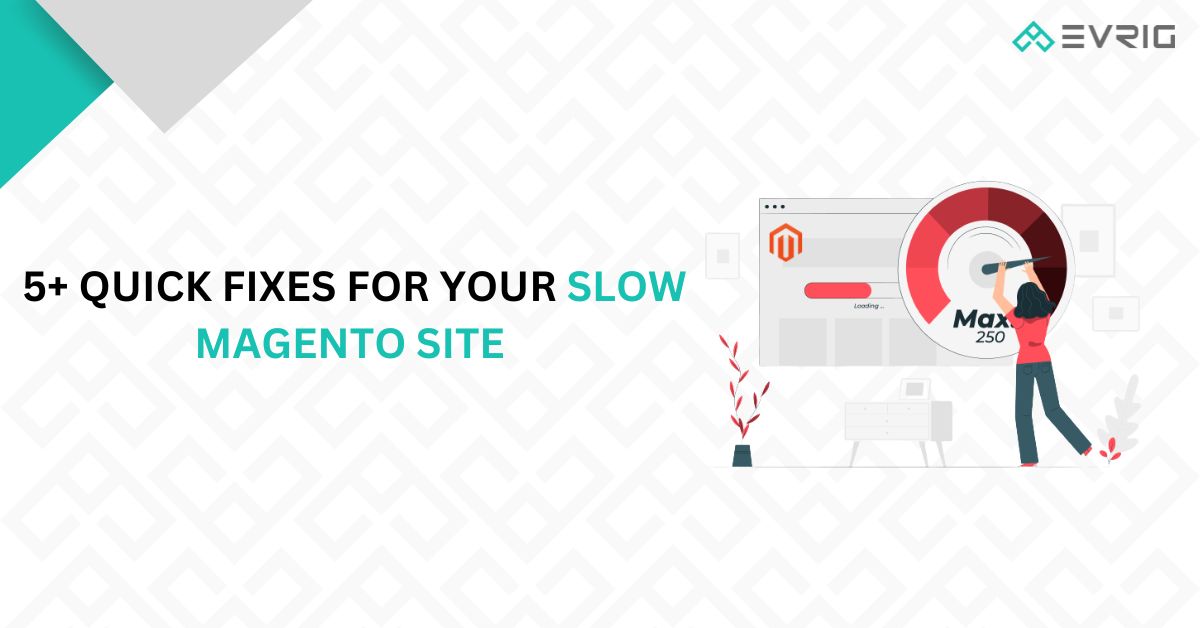5+ Quick Fixes for Your slow Magento Site – Speed Up Today!
- October 25, 2023
- Posted by: Vijay Golani
- Categories: Magento, Magento 2

Having a slow-loading Magento website can really mess up your business. Here’s a surprising fact: if a website is slow, 64% of unhappy customers won’t give it a second chance. Imagine, 1 out of every 4 visitors says goodbye if a website takes more than 4 seconds to load!
To fix this problem, it’s essential to figure out what’s causing it. While some problems are easy to spot, others need the expertise of a reliable Magento performance optimization services.
What are the six factors that could slow down your Magento website?
If your Magento 2 website is slow, it can lead to low conversion rates. Nobody enjoys waiting, and if your website is sluggish, it frustrates your visitors. These frustrated visitors could have become your customers, but slow performance drove them away. How can you prevent this from happening again? There could be various reasons behind your Magento website’s poor performance, and some of them are outlined below: –
1. Hosting Server
Many times, web hosting services located far from the main server’s location can make websites slower. That’s why if your hosting provider is distant from your place, your website might lag. Hence, it’s wise to opt for a solution closer to you for swift and secure operation.
2. Caching
Many website owners tend to turn off data caching, preventing browsers from saving HTTP requests, database queries, and images. This significantly slows down your website. So, it’s crucial to make sure your data caching is enabled for a faster web loading experience.
3. Updating
Updating your Magento website to the latest version can often be the key to a faster performance. Magento consistently addresses bugs and problems in their updates to offer their users the best service. Therefore, it’s essential to regularly update your Magento website to the current version.
Also Read: https://www.evrig.com/blog/how-to-overcome-magento-2-data-upgrade-errors/
4. Third-Party Extensions
Using too many third-party extensions can make your Magento websites slow. Some extensions might cause both performance and security problems, leading to your website becoming sluggish. So, it’s important to remove extensions you don’t need and carefully assess third-party extensions before installing them.
5. Unoptimized images and videos
While high-quality images and videos are essential for a website, they can also slow it down, leading to a poor user experience. E-commerce websites, in particular, use numerous pictures and videos, and if these media files are not optimized, they can consume a significant amount of storage space and decrease your website’s speed.
6. Theme
A badly coded theme can make your website sluggish. Opting for a straightforward theme that maintains speed while providing the necessary features is a better choice. Alternatively, you can pick customized themes to stay innovative without sacrificing speed.
Owners of Magento websites must address their slow-loading sites. The tips mentioned above can assist you in identifying and resolving common issues faced by website owners. By doing so, you can keep your existing customers, attract new leads, and expand your business.
2 Comments
Comments are closed.
[…] Also Read: https://www.evrig.com/blog/5-quick-fixes-for-your-slow-magento-site/ […]
[…] Also Read: https://www.evrig.com/blog/5-quick-fixes-for-your-slow-magento-site/ […]